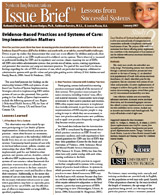

Published by:
Case Studies of System Implementation
For more than 20 years, stakeholders across the country have worked to reform children’s mental health services by creating community-based systems of care. “System of care” is an organizational philosophy that involves collaboration across agencies, families, and youth for the purpose of improving access and expanding the array of coordinated community-based services and supports for children with serious emotional disturbance (SED) and their families. Research has demonstrated that systems of care have a positive effect on the structure, organization, and availability of services for children with SED; however, the field of children’s mental health has much to learn about how local systems of care actually develop, the conditions that support or impede their implementation, and what factors interact together to establish well-functioning systems. As one of six interrelated studies from the Research and Training Center for Children's Mental Health's research program from 2004-2009, the purpose of RTC Study 2: Case Studies of System Implementation was to identify strategies that local communities undertake in implementing community-based systems of care and provide greater understanding of how factors affecting system implementation contribute to the development of local systems of care for children with serious emotional disturbance and their families.
Findings are still being analyzed and disseminated. To date, study findings are summarized in issue briefs, site-based reports and peer-reviewed publications.For your attention
Would you be willing to respond (at a later date) to a brief survey on these publications and how they helped you or how they could be improved? If so, please enter an email address at which we may contact you.
System Implementation Issue Briefs
- System of Care Definition
System Implementation Issue Brief #1 (2007)
[174kb pdf] - Critical Factors in System of Care Implementation
System Implementation Issue Brief #2 (2007)
[187kb pdf] - Strategies for System of Care Development: Locally Identified Factors for System Implementation Supplement to Issue Brief #2 (2007)
[300kb pdf] - Leadership Qualities in Successful Systems of Care
System Implementation Issue Brief #3 (2007)
[185kb pdf] - Evidence-based Practices and Systems of Care: Implementation Matters System Implementation Issue Brief #4 (2007)
[167kb pdf] - What Works: System Development Strategies Across Communities
System Implementation Issue Brief #5
[217kb pdf] - Quality Improvement Strategies that Work
System Implementation Issue Brief #6 (2008)
[205kb pdf] - Marion County, Indiana System of Care: The Dawn Project (2009)
[1.4mb pdf] - The Westchester Community Network (2008)
[1.3mb pdf] - Hawaii System of Care (2007)
[792kb pdf] - Placer County California Children’s System of Care (2007)
[1000kb pdf] - Santa Cruz County California Children’s System of Care (2007)
[768kb pdf] - Nebraska Region 3 System of Care (2007)
[1.2mb pdf]
Site-Based Reports
This series of reports describe system specific efforts to leverage change in established system of care communities. They provide insight into particular successes as well as areas for further development.About the Center
Resources
- » Data Trends
- » School-Based Mental Health
- » Financing
- » Cultural Competence
- » Case Studies of System Implementation
- » Workforce Development & University-based Training
- » National Directory of Family-Run and Youth-Guided Organizations
- » Theory of Change Logic Models for SOC

